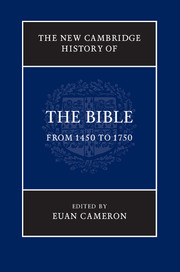Book contents
- Frontmatter
- Contents
- List of figures
- List of contributors
- Preface
- List of abbreviations
- Introduction
- PART I RETRIEVING AND EDITING THE TEXT IN EARLY MODERN EUROPE
- PART II PRODUCING AND DISSEMINATING THE BIBLE IN TRANSLATION
- PART III PROCESSING THE BIBLE: COMMENTARY, CATECHESIS, LITURGY
- PART IV THE BIBLE IN THE BROADER CULTURE
- 25 The Bible in political thought and political debates, c. 1500–1750
- 26 The problem of ‘spiritual discipline’: Apocryphal books among sixteenth-century leaders of the Lutheran churches
- 27 The Bible and the emerging ‘scientific’ world-view
- 28 Between humanism and Enlightenment: Morality, reason and history as factors in biblical interpretation
- 29 The Bible and the early modern sense of history
- 30 The Bible and literature in the European Renaissance
- 31 The Bible and the visual arts in early modern Europe
- 32 The Bible and music in the early modern period (1450–1750)
- PART V BEYOND EUROPE
- Afterword
- Select bibliography
- Select Bible bibliography
- Index
25 - The Bible in political thought and political debates, c. 1500–1750
from PART IV - THE BIBLE IN THE BROADER CULTURE
Published online by Cambridge University Press: 05 August 2016
- Frontmatter
- Contents
- List of figures
- List of contributors
- Preface
- List of abbreviations
- Introduction
- PART I RETRIEVING AND EDITING THE TEXT IN EARLY MODERN EUROPE
- PART II PRODUCING AND DISSEMINATING THE BIBLE IN TRANSLATION
- PART III PROCESSING THE BIBLE: COMMENTARY, CATECHESIS, LITURGY
- PART IV THE BIBLE IN THE BROADER CULTURE
- 25 The Bible in political thought and political debates, c. 1500–1750
- 26 The problem of ‘spiritual discipline’: Apocryphal books among sixteenth-century leaders of the Lutheran churches
- 27 The Bible and the emerging ‘scientific’ world-view
- 28 Between humanism and Enlightenment: Morality, reason and history as factors in biblical interpretation
- 29 The Bible and the early modern sense of history
- 30 The Bible and literature in the European Renaissance
- 31 The Bible and the visual arts in early modern Europe
- 32 The Bible and music in the early modern period (1450–1750)
- PART V BEYOND EUROPE
- Afterword
- Select bibliography
- Select Bible bibliography
- Index
Summary
In a 2010 interview about his decades-long fight against South African apartheid, Archbishop Desmond Tutu described his ‘[discovery] that the Bible could be such dynamite … If these white people had intended keeping us under,’ he went on to say, ‘they shouldn't have given us the Bible.’ The Bible, for Tutu and his supporters, could be a powerful weapon in the hands of any revolutionary struggling for justice. Its power came from its ability to function as a transcendent source of authority that could challenge the claims to legitimacy of unjust but long-established political institutions.
Tutu's ‘discovery’ ultimately has its historical roots in the complex events of the early modern period. During this time the spread of printing and the subsequent rise in literacy, the emergence of new forms of European religious pluralism alongside the increasing dominance of the modern territorial state, and shifting attitudes about the nature of authority and its relationship to texts – among other factors – laid the foundation for a profound reorientation in the Bible's political meaning. In this chapter we will adumbrate the trajectory of that change. The Reformation and its forerunners, such as Lollardy in England, initially cast the Bible in the role of an incendiary weapon, rendering ordinary Christians capable of combating, destabilising and overturning long-established authorities. Over several generations, however, strong countervailing tendencies began to emerge, reframing the biblical text as an instrument of conservatism and retrenchment, best suited for the defence of the political status quo.
In the cultural and religious landscape of early modern Europe individuals and communities drew political meanings from the biblical text using distinctive styles and strategies for reading and appropriation. To understand the political role of the Bible and the ideas taken from its text, we need to recognise the critical differences between these reading strategies and how their use changed over time during the period we are examining. We can recognise the existence of three distinct such reading strategies, which, for the sake of convenience, I will here call ‘modes’. In political settings, most early modern interactions between reader and scriptural text tend to fall into one of the following categories, although a degree of overlap is to be expected. First, and probably most intuitively familiar to modern readers, is the proof-texting mode.
- Type
- Chapter
- Information
- The New Cambridge History of the Bible , pp. 581 - 602Publisher: Cambridge University PressPrint publication year: 2016



